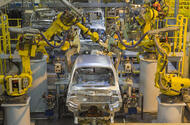UK car manufacturing falls 9% as investment plummets
 Car production in the UK hits a five-year low as industry says it’s on ‘red alert’ from Brexit
Car production in the UK hits a five-year low as industry says it’s on ‘red alert’ from Brexit
UK car production fell by 9.1% year-on-year in 2018, while automotive investment almost halved, according to the Society of Motor Manufacturers and Traders (SMMT).
UK car plants produced 1.52 million cars in 2018, the lowest figure in five years. Cars made and sold in the UK fell 16.3% while exports dropped 7.3%. Eight in ten cars made in the UK are exported.
The decline is being blamed on regulatory changes and diesel policy uncertainty, plus slumps in demand in both China and Europe. Declining consumer and business confidence as a result of Brexit is another major factor were also cited.
“The bottom line is that it’s a deeply depressing figure," said SMMT chief executive Mike Hawes. "Product cycles always have an effect. WLTP [emissions changes] affected production. Diesel uncertainty - not just in the UK but also in Europe, but particularly Germany and France - was a factor.
Opinion: will Brexit kill the British car industry?
“Furthermore, there is falling business and consumer confidence here and elsewhere, and UK manufacturers are exposed to the global market.”
Meanwhile, investment in the UK automotive industry plummeted by 46.5% to £588.6m. It is the first time since 2012 that investment has been less than £1bn. Firms announcing investments in 2018 included Aston Martin and car seating and electrical company Lear.
Hawes said: “The most alarming figure [here] is around automotive investment. It has effectively stalled. The manufacturers need to make underlying investments but a lot of that is on hold until we see what the future is. They are saying: ‘Do we have the confidence to invest in that plant when there is this [Brexit] uncertainty?’”
Jaguar Land Rover and Nissan production falls
Coventry-based Jaguar Land Rover, which announced 4500 job losses and factory shutdowns earlier this month, remains the biggest car maker in the UK. Its output fell by 15.6% in 2018 to 449,304 units across its three factories in Castle Bromwich, Halewood and Solihull respectively.
The hardest hit was Vauxhall, with its production falling by 15.9% to 77,481. The PSA-owned firm only produces one car in the UK at its Ellesmere Port plant, the Astra.
Meanwhile, Nissan output fell 10.7%, Toyota’s dropped 10.4% and Honda’s decreased by a modest 2.1%.
Mini bucked the trend, with a 7% rise. It produced 234,183 cars in its Oxford facility in 2018.
The top British best-sellers worldwide were:
2. Mini
3. Honda Civic
4. Toyota Auris
7. Nissan Juke
8. Range Rover
10. Jaguar F-Pace
The number of diesel cars made in the UK fell by 22% to 561,384 units, while petrol production dropped 3.5%. Alternatively-fuelled vehicle production rose by 41.5% to 142,732 units. The electric Nissan Leaf is built in Sunderland and the plug-in hybrid Range Rover and Range Rover Sport are also made in the UK.
UK exports around the world in 2018
Hawes described output to Europe, which has fallen 7.3%, as “pretty flat” and noted it was “still overwhelming the biggest market.
UK car exports to China suffered the biggest hit in 2018, falling 24.5%.
Growing markets included the USA (+5.3%), making it the UK’s second biggest customer after the EU, Japan (+26%) and South Korea (+23.5%).
According to the SMMT, two-thirds of the UK’s car exports are to Europe or those with preferential EU trade agreements.
A spokesman said: “Time has almost run out to guarantee continuity of any of these arrangements before Brexit, and ‘no deal’ could therefore put more than two-thirds of UK Automotive’s global trade under threat.”
The Brexit effect
Hawes said he hoped that the industry “has not reached the point of no return” in relation to the damage already done since the Brexit referendum.
He said the supply chain is particularly vulnerable, as it quickly feels the effect of falls in manufacturer volume.
Talking about the mood within the industry, he said: “We’re not at the Financial Crisis levels [of 2008]. But the lack of clarity means the mood is incredibly nervous and everybody is increasingly exasperated.
If there is a Brexit transition, Hawes predicts production will fall by a further 20,000 units in 2019. He said it was “impossible to put a number on production under a ‘no deal’ scenario.
“Long term, ‘no deal’ would be a catastrophe for the industry. It would be hard to see the levels of production volumes that we currently have. Three or four years ago, I was bullish about the state of UK car manufacturing. I’m anything but now.”
He concluded: ““With fewer than 60 days before we leave the EU and the risk of crashing out without a deal looking increasingly real, UK Automotive is on red alert. Brexit uncertainty has already done enormous damage to output, investment and jobs. Yet this is nothing compared with the permanent devastation caused by severing our frictionless trade links overnight, not just with the EU but with the many other global markets with which we currently trade freely.
“Given the global headwinds, the challenges to the sector are immense. Brexit is the clear and present danger and, with thousands of jobs on the line, we urge all parties to do whatever it takes to save us from ‘no deal’.”
READ MORE
Car industry body to launch no-deal Brexit aid package for small firms
UK car industry: no-deal Brexit could have 'devastating impact'
Comments
Post a Comment